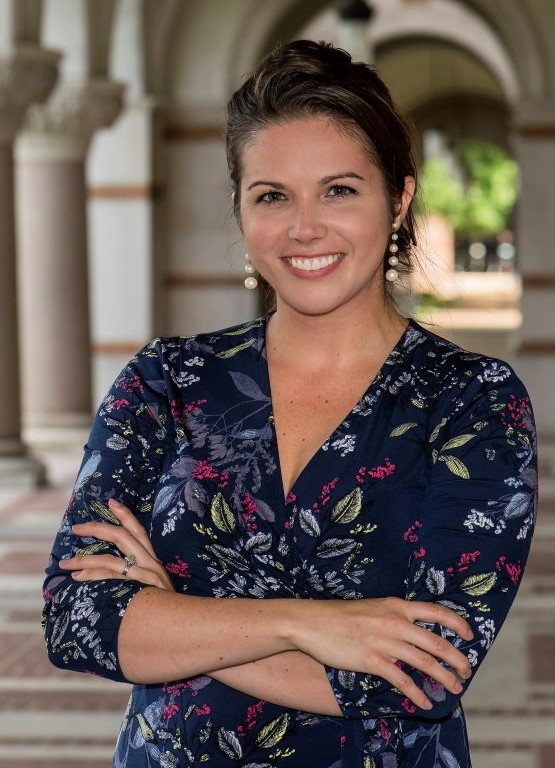Angie LeRoy, Ph.D.
Assistant Professor of Psychology and Neuroscience
Psychology & Neuroscience

Education
Ph.D. Social Psychology with Minor in Quantitative Methods, University of Houston; 2018
M.A. Social Psychology, University of Houston 2015
B.S. Psychology, University of North Florida 2011
Bio
Dr. LeRoy received her Ph.D. in Social Psychology from the University of Houston, with her dissertation focusing on the role of attachment and naturally occurring variation in the OPRM1 (mu-opioid receptor) gene in differential grief responses. During her years at the University of Houston, she received training in extending and applying social psychology theory to solve real-world health problems. She then pursued a post-doctoral research fellowship at Rice University, where she conducted psychoneuroimmunology research for four years. Her training was supported by a Kirschstein National Research Service (F32) Award from the National Heart, Lung, and Blood Institute (NHLBI), which allowed for unique training experiences with leading psychoneuroimmunologists in the Texas Medical Center, including the University of Texas MD Anderson Cancer Center. Over time, Dr. LeRoy developed a research program investigating how socially threatening situations (e.g., loneliness, ostracism, rejection, the loss of a loved one) impact mental and physical health and well-being across the lifespan. Dr. LeRoy came to Baylor and started the Baylor “HEAL” Lab in Fall 2022. Beyond her academic pursuits, Dr. LeRoy is an avid horse-enthusiast, and gravitates toward animals and spending time outdoors. She believes that balance is the key to a happy life, and as such, she advocates for a healthy work-life balance. She also maintains a yoga and meditation practice, which guides her faith.
Research
Dr. LeRoy is the Director and Principal Investigator of The Baylor “HEAL” Lab, Studying HEalth Across the Lifespan. Dr. LeRoy includes a variety of health-related measures in her research studies including biomarkers of immunity, parasympathetic nervous system activity, observational wound healing, and patient-reported outcomes. One of the HEAL lab’s core initiatives is to elucidate the various physiological and neurobiological systems involved in human responses to social separation—particularly in cases when an individual is separated from someone with whom they have formed an attachment relationship (e.g., mother-child dyads, romantic partners), whether it be brief (e.g., temporary physical separation due to travel or quarantine) or prolonged (e.g., following divorce from a partner, or the death of a partner). In addition, the HEAL lab develops and implements interventions to help people heal after social loss. Dr. LeRoy was recently awarded a National Institutes of Health K01 Career Development Award, funded by the National Institute on Aging, which will support the development and initial testing of an online expressive writing intervention for spousal caregivers of people with Alzheimer’s Disease or a related Dementia. This work will be conducted at the Baylor HEAL Lab in Downtown Waco, in addition to mobile lab units traveling across central and east Texas.
Representative Publications
Brown, R.L., LeRoy, A.S., Chen, M.A., Suchting, R., Jaremka, L.M., Liu, J., Heijnen, C.J., & Fagundes, C. P. (2022). Grief Symptoms Promote Inflammation During Acute Stress Among Bereaved Spouses. Psychological Science.
LeRoy, A. S., Knee, C. R., Derrick, J. L., & Fagundes, C. P. (2019). Implications for reward processing in differential responses to loss: Impacts on attachment hierarchy reorganization. Personality and Social Psychology Review, 23(4), 391-405.
LeRoy, A. S., Gabert, T., Garcini, L., Murdock. K. W., Heijnen, C., & Fagundes, C. P. (2020). Attachment orientations and loss adjustment among bereaved spouses. Psychoneuroendocrinology, 112, 104401.
LeRoy, A. S., Murdock, K. W., Jaremka, L. M., Loya, A., & Fagundes, C. P. (2017). Loneliness predicts self-reported cold symptoms after a viral challenge. Health Psychology, 36(5), 512-520.
LeRoy, A. S., Fagundes, C. P., Zvolensky, M., Lu, Q., & *Ramirez, J. (2017). Anxiety sensitivity moderates the painful effects of feeling burdensome to others. Cognitive Behaviour Therapy, 47(2), 126-138.
Wirth, J.W., LeRoy, A. S., & Bernstein, M. J. (2019). “You’re such a pain!” Investigating how psychological pain influences the ostracism of a burdensome group member. Group Processes and Intergroup Relations, 23(4), 519-545.
See my Google Scholar page for complete list of publications.
Awards & Current Grants
K01 Career Development Award (June 2022-May 2027). Writing to Heal: Developing an Internet-Based Cognitive-Behavioral Writing. Intervention for Alzheimer’s Disease Spousal Caregivers
Funded by the National Institute on Aging
Graduate Student Recruitment
Dr. LeRoy is accepting graduate student applications for Fall 2024 entry into our Ph.D. Program
Current Ph.D. Students
Valentina Maza
Samantha Weiss
Allie Henderson
Baylor Courses Taught
NSC/PSYC 4312, Behavioral Medicine